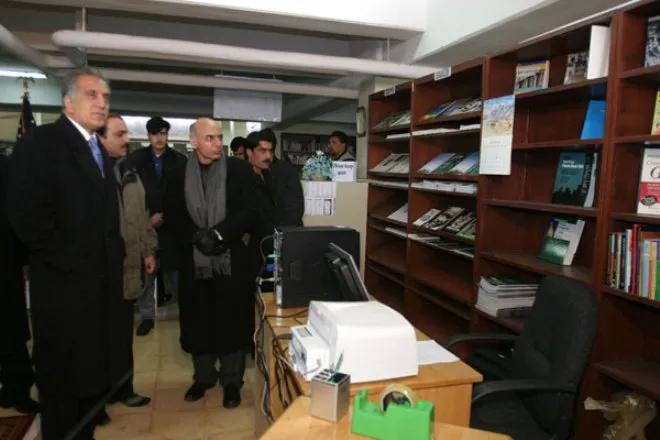-
CENTRES
Progammes & Centres
Location

US President Donald Trump is right about the irrelevance of any library that India has built in Afghanistan; once the US leaves Afghanistan, which it eventually must, all the work done in the embattled country will inevitably turn to dust. India, hurt by his ridiculing the development work that it has done in Afghanistan, trotted out a $3 billion list of development projects, but failed to respond to his question, “Why is India not in Afghanistan fighting the Taliban?”
Pakistan is the global master of Jihad. It has wielded mujahideen as an auxiliary to its conventional military, operating outside all limitations and rules of military engagement, and it’s been at it for 71 years. But its capacity for jihad exploded into devastating scale and sophistication when the US bankrolled it to drive the Soviets out of Afghanistan.
Immediately after the Soviets left in 1989, Pakistan turned that monster against India, in Kashmir. But its assault on India failed and stagnated, as New Delhi proved able to hold its ground indefinitely with boots on the ground.
Had India committed combat troops to Afghanistan, Pakistan would have come alive with the call for jihad. It would have started producing would-be martyrs from every village and neighborhood, donations for this war would have start filling the coffers of every mosque in the country, the Pakistani army would have provided all the arms, training, and logistics needed while putting on a show of innocence. A hundred thousand mujahideen and more, veterans and new recruits, under organizations such as Lashkar-e-Taiba and Hizb-ul-Mujahideen would have flowed into Afghanistan, armed to the teeth and backed by the Pakistani Army and mosques to slaughter as many Indians as they could.
What started as the American fight against the Taliban would have become Pakistan’s all out proxy war against India. Afghanistan would have become India’s Vietnam, and Vietnam 2.0 for the US if it didn’t cut its losses and leave India holding the bag. That’s why India is not fighting the Taliban in Afghanistan.
However, the main question for Trump to reflect on is this: Why did the US political leadership not understand the treachery and duplicity of Pakistan would resort to prevent American success in Afghanistan? Why does the US leadership not account for cunning and guile of its partners? How arrogant in its ignorance does the political leadership of a country that is going to war have to be to not bother calculating the socio-political costs it was demanding from a country it bullied into cooperation? Why did the US leadership not study what Pakistan could and would do to protect its own interests?
By 2003, it had become clear that then Pakistan president Pervez Musharraf had worked out a strategy in which his country would endure the blowback from the jihad machine for its cooperation with the United States in Afghanistan, but also preserve the most valuable of its jihadist assets until the US was exhausted, and milk the Americans for resources as long as it stayed in Afghanistan. Remember the time when the US was trying to sell F-16s, air-to-air missiles, anti-ship missiles, amongst a host of other weapons like artillery, supposedly for its counter insurgency operations against the Taliban?
Setting aside the little detail that Taliban had no aircraft or ships; no one was under any illusions that Pakistan intended to act against the groups that every interested party understood were working to deny the US success in stabilising and democratising Afghanistan. It was clear that these groups were Pakistan’s allies, and that it intended to use them as its proxies to control Afghanistan after the Americans withdrew in defeat.
The administration of George W. Bush failed to perceive Pakistan’s mastery of its own environment, its keen instinct for the weaknesses of the US, and its expertise at primitive forms of statecraft revolving around religion and tribe that democracies are ill-equipped to deal with. The US has been effectively entangled by Pakistan via the latter’s cunning understanding of American domestic political dynamics.
When Washington insisted on Pakistan’s cooperation in bringing Afghanistan to a rubble after 9/11, Islamabad well understood that, one, the US did not have the political will or the interest to stay entrenched in Afghanistan long enough to exhaust Pakistan’s ability to interfere, and two, it did not have the taste for suffering the sheer quantity of casualties that it would take to create and sustain a viable, stable, democratic order in Afghanistan. Third, the task of stabilizing and democratizing Afghanistan was likely futile anyway, even without Pakistani interference, because hunger for power and greed would almost certainly cause any US built democratic order to collapse into a corrupt, vengeful, venal power struggle. Fourth, given these realities, Pakistan had every interest in outlasting the US presence in Afghanistan and in the meantime doing everything possible to ensure that it came out at the other end as the patron of the factions that would win and take over after the US withdrawal. Lastly, America could be made to pay a heavy price for its folly.
Even as the US is made to understand that it cannot have its way in Afghanistan, it is also made to understand that, like prior to 9/11, Afghanistan remains the most likely center for anti-American Islamist terrorists to organize, train and operate from.
The US will need to preserve the ability to monitor the situation and act in Afghanistan, and that meant buying Pakistan’s cooperation.
In effect, Pakistan has trapped the US in a situation from which it cannot turn away and in which it must keep paying bribes to the Islamic Republic to retain some leverage in order to prevent Afghanistan from becoming global jihad central headquarters again. The US is still in Afghanistan after 17 years because Pakistan dodged the threat of being “bombed to the stone age”, and soon spun around to take America by the short hair, and its still got Trump.
This all might have been avoided had former US president Richard Nixon not saved Pakistan in 1971. Pakistan had just carried out a vast genocide and ethnic cleansing pogrom in East Pakistan. India took it upon itself to liberate East Pakistan, leading to the formation of Bangladesh. Had Nixon not threatened India and saved Pakistan, India would have almost certainly demilitarized it, taken back its territory that Pakistan occupied in 1948, and withdrawn. Had Pakistan been demilitarized then and its freedom to engage in militaristic and nuclear misadventures curtailed, there would have been no military-mosque jihad machinery, there would have been no Taliban, there would have been no safe haven in South Asia for Osama Bin Laden, 9/11 might never have happened and the Afghanistan and Iraq wars would not have happened.
In the 1970s, as in 2001, American political and military leadership didn’t understand what they were dealing with in Pakistan. Instead there was Charlie Wilson’s War. Not only did America finance the construction of Pakistan’s vast jihad empire, American presidents kept certifying that Pakistan was not developing nuclear weapons when in fact it was. The US enabled Pakistan to develop a nuclear umbrella from under which to run its vast state-sponsored jihad complex, thanks to which India became powerless to act. For its folly, the US has tasted the bitterness of defeat in Afghanistan at the hands of Pakistan, the godfather of the Mujahideen.
Trump needs to think about the decades of lack of perception and foresight on the part of the US in dealing with Pakistan, rather than shaming India for being smarter than the Americans on that front. American political leadership and bureaucracy have been repeatedly incapable of handling its two-faced allies, from Saudi Arabia to Pakistan.
President Trump does seem to be different from previous American presidents. He made the right moves to create space for Turkey at the cost of the Saudi monarchy, announcing US withdrawal from Syria, and signaling a fast-forward withdrawal from Afghanistan too. For the future, if the US, starting with its president, had a greater respect and appreciation for how India has been dealing with actors in its region that have bedeviled America, Trump would likely find New Delhi an exceptional ally in shared objectives of democracy and peace through prosperity.
The views expressed above belong to the author(s). ORF research and analyses now available on Telegram! Click here to access our curated content — blogs, longforms and interviews.

Harbir Singh is an International Affairs analyst Political Commentator and Writer.
Read More +